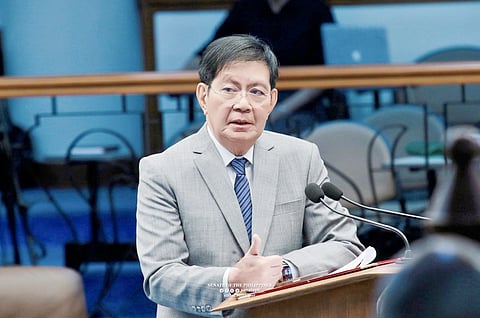
- NEWS
- the EDIT
- COMMENTARY
- BUSINESS
- LIFE
- SHOW
- ACTION
- GLOBAL GOALS
- SNAPS
- DYARYO TIRADA
- MORE

Senate President Pro Tempore Panfilo "Ping" M. Lacson on Monday defended the practice of budget insertions as part of the legislative mandate by Congress but warned that the system has long been exploited by some lawmakers for personal and political gain.
In a radio interview, Lacson revealed that both chambers of Congress—particularly the House of Representatives—introduced massive amendments or “insertions” to the 2025 national budget, raising serious concerns over transparency, corruption, and constitutional violations.
“Introducing insertions is not illegal. It is our mandate as lawmakers to review the National Expenditure Program and introduce amendments. The problem is that many lawmakers abused this mandate,” he said.
According to Lacson, the Senate alone made over P100 billion worth of insertions into the budget of the Department of Public Works and Highways (DPWH), a department he says has become a hotspot for corruption due to lawmakers’ alleged collusion with public works officials to siphon off funds via infrastructure projects, including flood control initiatives.
He pointed to a detailed document listing House members’ insertions into the DPWH budget, describing it as “like a roll call” of legislators.
When asked whether the House’s total insertions surpassed that of the Senate, Lacson responded unequivocally: “Much, much more.”
Lacson warned that the practice of overloading the DPWH budget—allegedly to accommodate kickbacks—has reached dangerous levels, even surpassing the allocation for the education sector, which is guaranteed priority under the 1987 Constitution.
“The system of corruption has been in place, with lawmakers dealing with the district engineer and former Undersecretary Roberto Bernardo. That’s the pattern,” Lacson claimed.
“You see the DPWH getting a bigger budget than the education sector because everyone involved got greedier and greedier and stuffed the DPWH’s budget. That is unacceptable.”
While Lacson acknowledged that some insertions were held and tagged “For Later Release” by the Department of Budget and Management (DBM), he cautioned that this could disrupt the economy by stalling funding for well-vetted, urgently needed projects.
He reiterated his longstanding call for greater transparency in the budget process, particularly during the plenary period of individual amendments.
Lacson said the Senate should take the lead by disclosing the names of lawmakers proposing budget changes.
“We need to be totally transparent in the budget deliberations of the 2026 budget measure. The Senate must lead the way, at least by revealing the identities of the proponents of such individual amendments,” he said.
Lacson urged fellow lawmakers to exercise self-restraint in the upcoming 2026 budget deliberations and respond to growing public frustration over the misuse of public funds.
